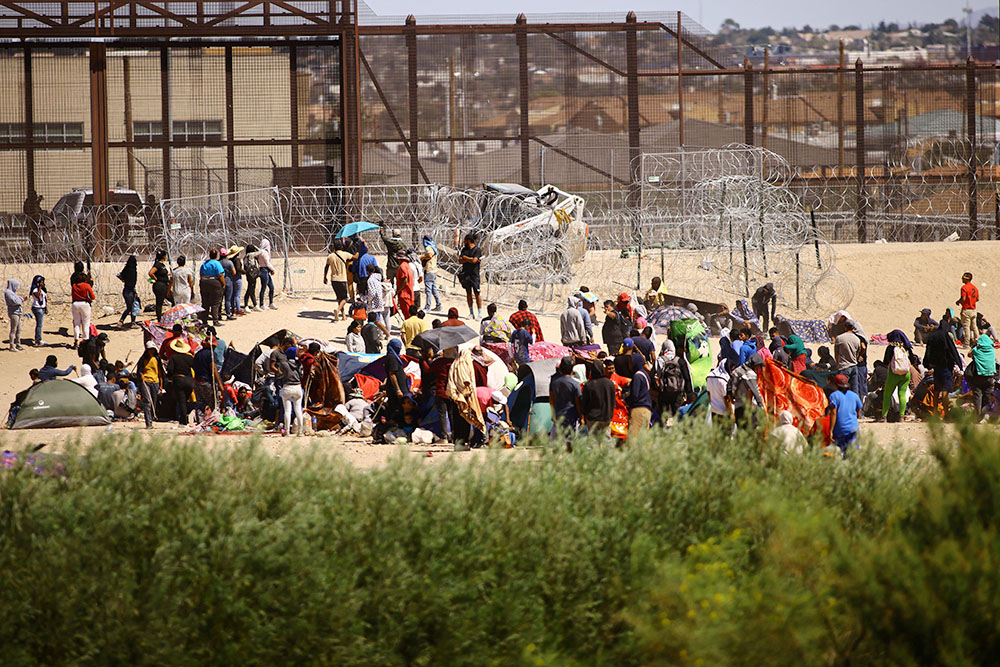
Migrants, mostly from Venezuela, are seen from Ciudad Juárez, Mexico, as they gather near the U.S. border wall Sept. 24, after crossing the Rio Grande with the intention of turning themselves in to U.S. Border Patrol agents to request asylum. (OSV News/Reuters/Jose Luis Gonzalez)
Some Republicans in Congress are using a false analogy in their attempts to add harsh border policies to the supplemental funding bill. They have linked the war in Ukraine to the U.S. border by suggesting that the invasion of Ukraine by Russia is similar to the entry of migrants into the U.S. at the southern border.
In recently introducing a restrictive border plan and tying its adoption to the passage of U.S. aid to Ukraine, Sen. James Lankford (R-Oklahoma) equated the two situations: "We are not going to secure other countries and not secure ours."
It is deceptive messaging and dangerous policy, as the war in Ukraine is nothing like what is happening on our southern border.
It should be clear. Ukraine was invaded by a hostile and larger neighbor — one of the largest armies in the world. They continue to face an existential threat — the possibility of having their country erased from the earth and subsumed into another one.
Without U.S. and European support, this is a real possibility with adverse global consequences, including for the United States. Should Ukraine lose the war, both Russia and China will be emboldened, increasing the chances for a direct conflict with the U.S.
The U.S.-Mexico border is another story altogether. While the numbers arriving at the border from our hemisphere and beyond are high, they do not represent a threat to our country akin to the Ukrainian situation.
Advertisement
Despite the use of fear tactics from immigration opponents, no terrorist attacks against our nation have originated from an undocumented immigrant crossing the southern border. The 9/11 terrorists entered legally, on student visas. And the unprecedented increase in immigration enforcement at the border since that fateful day has diminished the possibility significantly.
Nevertheless, Republican senators have conditioned aid to Ukraine upon policy changes that would make it virtually impossible for a migrant to qualify for asylum, as they would codify a ban on asylum for those who do not apply in a transit country. The measures also would install a Title 42-type authority to close the border when an administration decides it is needed to attain operational control of the border — a very subjective standard.
Perhaps most troubling, the proposal would change the standard for qualifying for an asylum hearing, determined through a credible fear interview, to a much higher legal standard. According to the American Immigration Lawyers Association (AILA), the adoption of this new standard would endanger people's lives, as bona fide asylum seekers would be subject to expedited removal to their persecutors.

Asylum-seeking migrants wait to be transported by U.S. law enforcement officers after crossing the Rio Grande river into the U.S. from Mexico in Eagle Pass, Texas, July 24. (OSV News/Reuters/Go Nakamura)
Moreover, one should not assume that making it tougher to qualify for credible fear would significantly stem the flow of migrants to the United States, as asylum seekers, desperate to survive, may try other ways to enter the country.
To put it mildly, the proposal is an overreach. Despite assertions to the contrary, increased encounters at the border do not necessarily translate into a spike in the undocumented population in the country, as other groups, such as Mexicans, are leaving the country to return home.
A recent study by the Center for Migration Studies of New York found an increase of only 100,000 undocumented persons in 2021 — statistically zero growth — at the same time apprehensions at the southern border began to rise.
Buoyed by their ability to win political points with their base on immigration, some Republicans are now willing to jeopardize U.S. national security for their immigration agenda by blocking funding for Ukraine. Long gone is the time when Republicans, echoing President Ronald Reagan, were on the front line of the Cold War as hawks against an expansionist former Soviet Union.
Sadly, we are at a place where everything, including global stability, is being risked for the sake of immigration politics.
Perhaps the biggest disappointment is that this latest push is coming from Sens. Lindsey Graham (R-South Carolina), John Cornyn (R-Texas), and Lankford, who should know better. They have been involved in negotiations on a comprehensive immigration bill in the past and know that it represents the best path toward repairing a broken system. Has statesmanship in the GOP been forgotten without Sen. John McCain?
Indeed, the U.S. asylum system requires reform, but it should not be done in a vacuum and with one side holding a gun in their hand. Any meaningful immigration reform must go through both sides of the aisle and the regular order for it to have legitimacy. Democrats, including President Joe Biden, should insist on this and reject a one-sided compromise on the supplemental funding bill.
Whether immigration opponents like it or not, immigration reform must happen, sooner rather than later. Congress can balance immigration enforcement with legal migration to create a system that benefits our economy and upholds the rule of law.
Sadly, we are at a place where everything, including global stability, is being risked for the sake of immigration politics. The failure to act on bipartisan immigration reform legislation may soon hurt the country not just at the border, but around the world.







